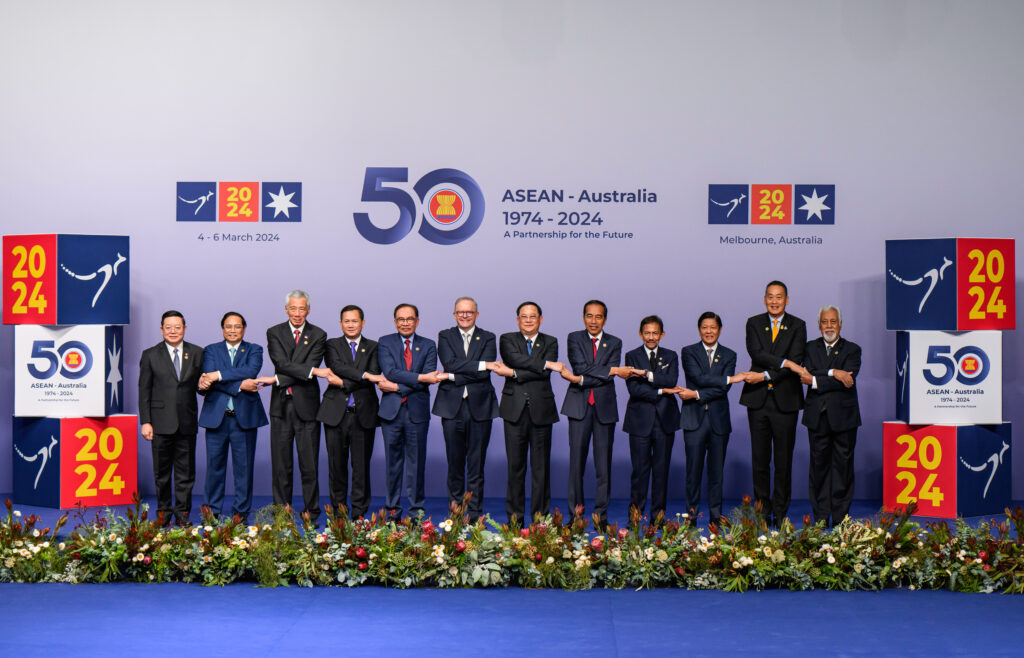Australia hosted the ASEAN–Australia Special Summit in Melbourne in March 2024 to mark 50 years as ASEAN’s first dialogue partner. Media was dominated by the diplomatic set pieces, cavalcades of black cars and glitzy events. But it was not just about the official meetings.
It’s worth documenting how Australia presented itself to Southeast Asian visitors through a whole-of-nation approach.
While this concept is not entirely new — for example, the G20 has multiple formal ‘tracks’ for engagement — this summit’s tracks were given significant status alongside the leaders-level discussion. When core foreign policy actors have reached out to other sectors, often it would be to brief them. A whole-of-nation approach goes beyond this as seeing mobilising these actors as key to foreign policy results.
For example, the government is well aware that Australia’s economic engagement with Southeast Asian countries has not kept pace with the growth of ASEAN economies, but the power to improve this lies in the hands of business leaders. This requires the government to reconceptualise its role less as soloist than as conductor. This includes articulating a narrative on the importance of the region and to motivating actors with public profiles to contribute to the conduct of diplomacy.
The summit brought together a range of government and non-state actors in line with a whole-of-nation approach to foreign policy, recognising that global engagement is not only the preserve of the national government. A wider constituency including business, science, education, sports, culture, media, community and civil society organisations has a significant role to play.
The summit included a ‘Maritime Cooperation Track’ of officials, universities and think tanks, and a forum on climate and the clean energy transition consisting of science, education, civil society and private sector representatives. There was also a forum for business leaders, a dialogue for emerging leaders to form bonds of trust and understanding and a conference that included a ‘marketplace’ offering advice and tools to Australian enterprises interested in doing business with Southeast Asia.
The preceding ASEAN–Australia Week featured outreach events involving state and local governments, business chambers, research organisations and universities. They focussed on topics including marine plastics, Indigenous fashion, e-safety, diaspora businesses and disaster resilience. Important external events surrounding the Special Summit included advocacy organisation Global Citizen’s parallel summit — which brought together social entrepreneurs working on humanity’s most pressing issues — and the diaspora-led protests about human rights in ASEAN countries.
The breadth and prominence of the summit’s multiple tracks suggest that Australia is updating its mental model of international policy in line with bipartisan support for a whole-of-nation approach.
The summit reflects increasing awareness that achieving Australia’s international goals requires a concerted effort from federal departments, national institutions, state and local governments and private sectors. A whole-of-nation approach goes beyond this simply core international policy actors, mobilising a diverse range of actors as key components of foreign policy.
The summit’s narrative — highlighted by Prime Minister Anthony Albanese’s remark that ‘more than any other region, Southeast Asia is where Australia’s future lies’ — centred the fact that the ASEAN region will be the world’s fourth-largest economy by 2040. The government articulated a clear agenda for mutual gain by setting four focus areas — trade and investment, climate change and green energy, maritime cooperation and the next generation of leaders.
Many of the government’s announcements emerging out of the summit were intended to spur various sectors with links to Southeast Asia, including an AU$2 billion (US$1.3 billion) fund to boost investment in clean energy and infrastructure projects, announced at a gathering of 100 chief executives. Ten ‘Business Champions’ were appointed to facilitate closer commercial links and ensure that the government and the private sector are working ‘in tandem’.
The summit also featured a welcome promise to improve the visa system for Southeast Asians — an effective way to improve economic ties.
Canberra pledged AU$64 million (US$43 million) to enhance maritime partnerships in Southeast Asia, an AU$10 million (US$7 million) investment to support relationships between climate and clean energy agencies across jurisdictions, and additional funding to support the Mekong region.
Albanese earmarked funds for the establishment of an ASEAN–Australia centre — together with 75 new scholarships and 55 emerging leaders’ fellowships —while the Australia–ASEAN Council announced grants for 38 community, university and business projects, such as rural health and women-led startups.
These announcements reflect that the optimistic vision in the summit’s ‘Melbourne Declaration’ must be supported by a range of partnerships. They range from inter-agency and interinstitutional collaboration with the Philippines, Vietnam and Malaysia to digital and environmental cooperation with countries like Singapore and Brunei. The broad approach — while well-received — could have gone further in areas such as sports diplomacy, cybersecurity or gender equality.
While it is impossible to gauge the overall reaction that Southeast Asian visitors had to Australia’s charm offensive, a Southeast Asian participant at one event commented, ‘this is the way you do a summit’ and suggested that other dialogue partners learn from this approach. The summit clarified the importance that Australia places on the region and the government’s willingness to mobilise resources to create and maintain deep and enduring ties with Southeast Asia.
Melissa Conley Tyler is Executive Director and Heather Wrathall is Senior Policy Analyst at the Asia- Pacific Development, Diplomacy & Defence Dialogue (AP4D).
This article draws upon AP4D’s report What does it look like for Australia to take… A Whole-of-Nation Approach to International Policy?, funded by the Australian Civil-Military Centre.


Australia — marking 50 years as ASEAN's first dialogue partner — held the ASEAN–Australia Special Summit in Melbourne in March 2024, taking a whole-of-nation approach to international policy. The summit facilitated discussions across various sectors and led to significant investment announcements that aim to boost both countries' economies, promote climate change action and foster relationships between emerging leaders.